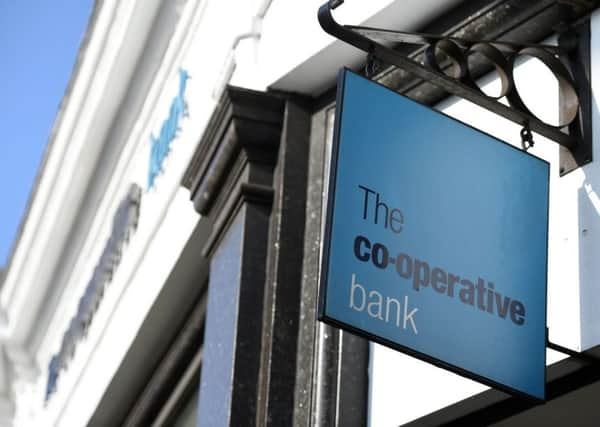Co-op Bank sheds 25,000 customers but trims losses
This article contains affiliate links. We may earn a small commission on items purchased through this article, but that does not affect our editorial judgement.


On the plus side, Co-op Bank reduced its losses to £135.2m in the six months to end-June, down from £177m a year earlier. But, showing the group is not out of the woods, it revealed that the haemorrhaging of customers and cash goes on against a backcloth of uncertainty about the financial lifeline thrown to it by the former mutual’s hedge fund investors.
Advertisement
Hide AdAdvertisement
Hide AdCo-op Bank said it had lost about another 25,000 current account customers since the end of 2016 and that £400m of instant access savings cash had been pulled out of the bank.
The lender, which has struggled since a £1.5 billion shortfall was discovered in its balance sheet in 2013, put itself up for sale earlier this year before the rescue deal was agreed with the hedge funds and bondholders.
Co-op Bank said yesterday that its latest six-month trading performance had been hit by “retail customer reaction to uncertainty” before and after that deal was agreed in June.
Despite the latest losses, which were widely flagged, Co-op Bank chief executive Liam Coleman said the business had put in a “resilient” performance.
Coleman said: “The vast majority of customers have remained very loyal as we have progressed the sale and capital raise process and I am extremely grateful for their ongoing support.
“Of course, there is more hard work ahead, and, like other banks, we recognise there are risks to the UK economy, but this is a great bank and we are positive about the future.”
Under the refinancing package agreed with its investors, which is expected to complete next month, the wider Co-op Group, whose businesses include food retail and funeral directors, will see its residual stake in the finance arm contract from 20 per cent to 1 per cent.
Advertisement
Hide AdAdvertisement
Hide AdThe lender has also agreed to divorce itself from the Co-op Group’s pension scheme. However, the bank will keep the Co-op brand and has pledged to retain “ethics at its heart”.
Co-op Bank has hailed the rescue deal as enabling it to meet regulatory requirements on long-term capital cushions, and allowing it to continue as a stand-alone bank.
The group, which has about four million customers overall, said its current account numbers fell nearly 2 per cent to 1.4 million in the first half, while loans fell to £15bn from £15.3bn a year ago.
It saw fewer mortgage completions – down £100m at £1.4bn – and redemptions almost doubled to £1.3bn from £700m a year earlier.
Coleman added that it had been a “challenging journey” in recent months, but said that customer account losses had “moderated” in May and June.
The group saw its full-time staff workforce fall by nearly 900 to just over 3,300, and Coleman warned that the bank would cut its headcount further to reduce its overheads.
This will mainly come from reductions in temporary staff and contractors – which halved in the first six months of 2017 – as well as natural staff turnover.
• The UK’s financial services sector is bracing for a slowdown as choppy economic conditions apply the brakes to mortgage and business lending, research published today has found, writes Ben Woods.
Advertisement
Hide AdAdvertisement
Hide AdThe stock of mortgage lending is expected to ease back to £1,184 billion next year, down from £1,192bn in 2017, according to influential think tank EY Item Club.
Mortgage demand will be impacted by the inflationary squeeze on household finances, but stocks will pick up to £1,196bn and £1,226bn in 2019 and 2020 respectively, the organisation said.
Business lending is also expected to suffer, falling from £425bn this year to £424bn in 2018, before returning to growth in 2019 at £427bn and stepping up again to £435bn by the end of the decade.
However, Omar Ali, EY’s UK financial services managing partner, said the growth swing for both areas would depend on Britain striking a transitional deal during its divorce talks with the EU. EY Item Club expects inflation to peak at 3 per cent this year.
• Challenger bank Aldermore has reported a 32 per cent rise in half-year profits to £78 million and said it notched up £1.6 billion in new lending, taking its total to some £8.1bn.
The group, which typically lends to small and medium-sized businesses, home-owners and landlords, saw mortgage lending increase by 9 per cent to £6.2bn.